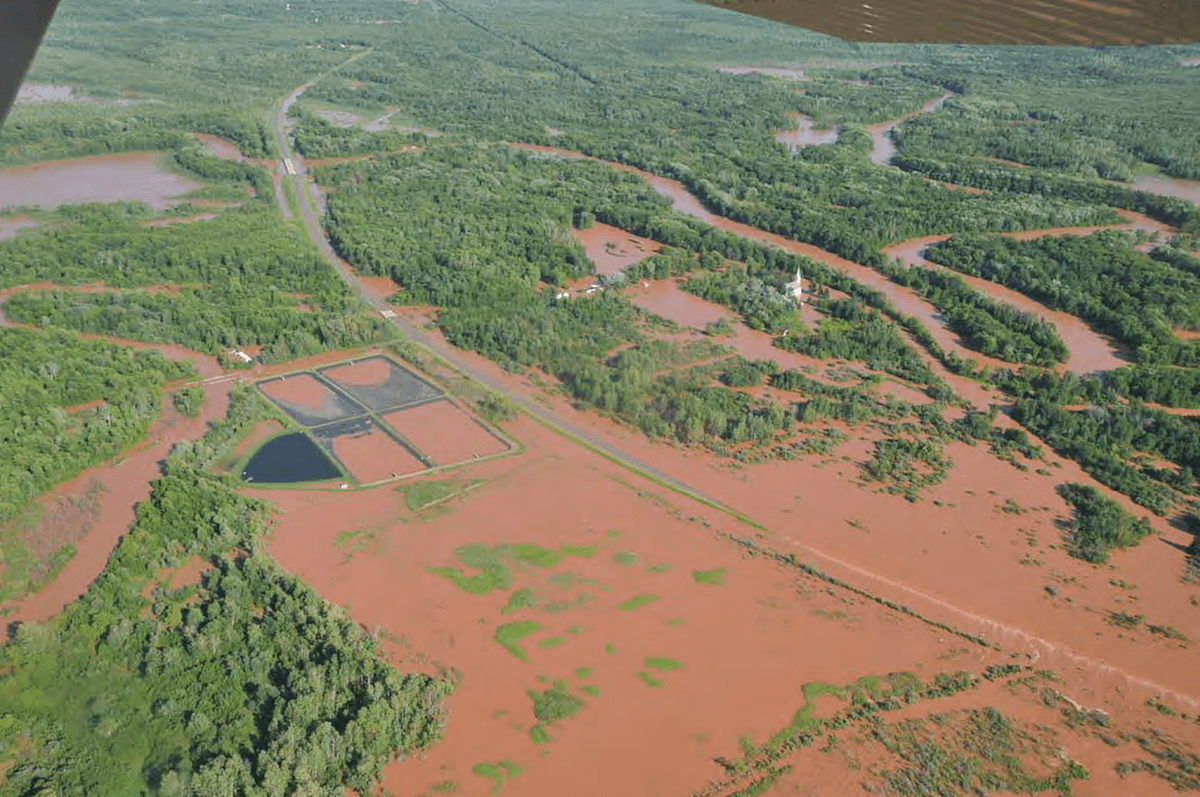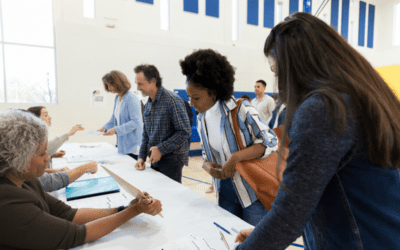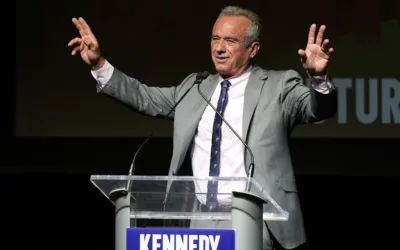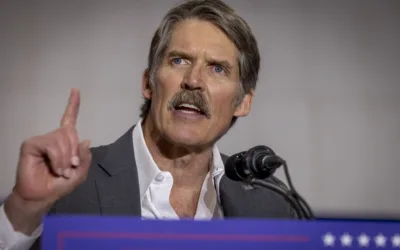
This photo from the Bad River Band of Lake Superior Chippewa shows the major flooding done on the river after multiple rounds of severe thunderstorms on July 11, 2016. Initial estimates put the damage to roads and other infrastructure at $25 million. A changing climate is creating conditions for stronger thunderstorms and flash floods.
The state and federal governments are each creating an Office of Environmental Justice to give voice to those who don’t have a seat at the table when plans are made that affect their environment.
[Editor’s Note — A message from our partners at Patagonia: Alaska may be far away, but the residents of Newtok face a threat familiar to many in Wisconsin: water will erase their home. To keep their culture and community intact, the Yup’ik residents must relocate their entire village upriver while battling government inertia. This is a film about a village seeking justice in the face of climate disaster. You can watch the whole movie (for free!) here.]
Because any place
you affix as home is an astonishment
Destiny or destination– you are home
And you know instinctively how to doubt it
Denise “Dee” Sweet, a Bayfield resident and a past Wisconsin Poet Laureate, opens “Homing Song: Two Stanzas” with a celebration of what constitutes home. She follows it almost immediately with an expression of the doubts that seize upon such sense of security.
Sweet is part of the Anishinaabe (Ojibwe) community that has lived with insecurity for generations. Her people lost their land and were forced to settle in spots others did not want. Once, after its namesake river flooded badly enough, the Bad River Band of Chippewa was forced to relocate the entire nearby community of Odanah.
Native peoples are among the groups most susceptible to the impacts of a changing climate in Wisconsin— more frequent flooding from stronger storms, wild winter fluctuations in temperature and snowfall, lower yields for crops and sap, algae blooms in more lakes, and damage to roads, bridges, and shorelines.
For Sweet and her community, climate change could pose a threat to their food supply.
“The fluctuation of water level and of temperature is quite destructive to the ecosystem that supports the wild rice fields,” Sweet said. “And it takes a long time for the germination period and for the grass to take root for vegetation that sinks to the bottom of the rivers. So when the river swells, that sediment is disturbed and it’s harder for it to be a secure kind of rooting.”
While a changing climate affects the entire planet, not everyone is treated equally by the consequences. Studies show low-income families, the elderly, and communities of color and the Indigenous like Sweet’s are also more likely to live in areas most affected by stronger storms, higher temperatures, and lower air quality because they lack the means to prepare for or recover from extreme weather conditions.
Recognizing this inequity has prompted a new standard in public service known as environmental justice—a concept that says decision-making that affects the environment should include the voices of those who are heavily impacted but frequently overlooked.
“We do it with everybody at the table. Everybody has a voice,” said Ryan Billingham of Wisconsin Conservation Voters. “That’s people from the tribes. That’s people from every zip code. That’s people from every economic level in the state. Everybody has to be at the table because this isn’t a problem affecting one group of people. It’s affecting all of us.”
Those voices will now have representation at the state and federal government levels.
“Too many Wisconsinites have felt the effects of climate change firsthand,” said Gov. Tony Evers last month in establishing a state Office of Environmental Justice. “Rural communities have had roads or bridges washed out. Farmers have lost crops or livestock due to extreme weather. Small business owners have seen their businesses destroyed by floods. The Office of Environmental Justice will play a critical role by helping promote policies and strategies to enhance climate resilience, ensuring our communities and families can prepare for and recover from the effects of climate change, and getting resources and support to folks who need our help the most.”
“This office is going to go a long way to getting more voices at the table,” said Billingham. “It’s so important to understand that [for] communities that are already facing significant struggles, significant challenges in the way of them being prosperous and thriving and healthy, an office like this is absolutely essential in managing and mitigating climate change.”
The office was initially proposed by Evers in his 2021 state budget bill. The provision was removed by Republicans who control the Wisconsin Legislature. Evers created the office through executive action.
Shortly after Evers’ announcement, the federal government also joined the movement as the Biden administration announced an Office of Environmental Justice would be created in the US Department of Justice. When investigating cases of environmental harm, for example, the office will put a priority on prosecuting cases that are impacting the communities most affected.
“Communities, particularly those with environmental justice concerns, deserve the assurance that their government will take vigorous enforcement action when polluters flout the law and jeopardize their well-being,” said Michael Regan, administrator of the US Environmental Protection Administration (EPA).
Billingham, while appreciative of the new state and federal offices, knows the work to mitigate the harms of climate change and reduce fossil fuel use has to include concentrated action at the local level.
“I perceive it as not just a threat to food sources, not just a threat to clean drinking water, but a threat to a traditional way of life as well,” he said. “So a lot of our work is working with local communities, local workers, local stakeholders, people who are concerned about the planet from a street corner perspective. You don’t have to save the world, but if you start on your street level and everybody starts on their street level, all of a sudden you’ve saved the world.”
Even deeper than whatever work can be done by the federal or state government, deeper than the local, street corner level, Sweet puts her focus on the moral level of caring for the environment—or the creation, as it is often referred to by native peoples.
“There is a moral issue with damaging the clean waters of Lake Superior,” she said. “People love it, they respect it, they honor it through ceremonies and tribal communities. They recognize their reliance on it, and they recognize the obligation that they have to plan for seven generations.”
In the long run, for environmental justice to truly take root beyond government regulations, it will take the work of many to re-embrace the creation, as is seen in this excerpt from Sweet’s poem “All the Animals Came Singing.”
We drained those windigo wetlands
paved them over or planted crops
that floundered or refused to take root;
We tried to fill and give function to the emptied camps
of the whooping cranes: or were we trying to fill
that empty nest in our hearts shaped by your absence?
We are told that it is inborn in all living beings
to return to the place of its beginning, to rise and sweep
with what strength is left and begin that wondrous trek
towards home, no matter the distance, no matter the passage.
Support Our Cause
Thank you for taking the time to read our work. Before you go, we hope you'll consider supporting our values-driven journalism, which has always strived to make clear what's really at stake for Wisconsinites and our future.
Since day one, our goal here at UpNorthNews has always been to empower people across the state with fact-based news and information. We believe that when people are armed with knowledge about what's happening in their local, state, and federal governments—including who is working on their behalf and who is actively trying to block efforts aimed at improving the daily lives of Wisconsin families—they will be inspired to become civically engaged.


New Biden rules deliver automatic cash refunds for canceled flights, ban surprise fees
In the aftermath of a canceled or delayed flight, there’s nothing less appealing than spending hours on the phone waiting to speak with an airline...

One year on the Wienermobile: The life of a Wisconsin hotdogger
20,000+ miles. 16 states. 40+ cities. 12 months. Hotdogger Samantha Benish has been hard at work since graduating from the University of...

Biden makes 4 million more workers eligible for overtime pay
The Biden administration announced a new rule Tuesday to expand overtime pay for around 4 million lower-paid salaried employees nationwide. The...

‘Radical’ Republican proposals threaten bipartisan farm bill, USDA Secretary says
In an appearance before the North American Agricultural Journalists last week, United States Department of Agriculture (USDA) Secretary Tom Vilsack...





